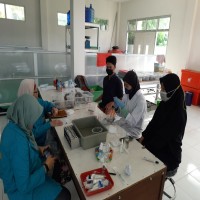


The Biology Study Program at the Faculty of Mathematics and Natural Sciences (FMIPA) of Universitas Tanjungpura (UNTAN) offers three graduate profiles that are essential for the workforce: Biology Researchers, Biological Resource Managers, and Bioentrepreneurs.

The findings of the Tracer Study, conducted by the Biology Department in collaboration with the UNTAN LPPPM Career Development Center, indicate that 70 to 80% of biology graduates have successfully secured employment, pursued entrepreneurial ventures, or continued their education at the postgraduate level within one year of graduation. Notably, this achievement occurs with a waiting period of less than six months, and the graduates' focus aligns increasingly with their designated profiles three years post-graduation.

Curriculum development within the Biology Study Program is conducted through workshops involving the Biology Consortium Association (KOBI), partner companies and institutions, stakeholders who are users of graduates, and alumni who have successfully entered the workforce. Additionally, insights derived from the analysis of the Biology Graduate Tracer Study are incorporated into this process. This collaborative approach serves as a mechanism for the Biology Study Program to identify labour market signals, encompassing both hard and soft skills, which are utilized as foundational elements for the evaluation and enhancement of the curriculum in alignment with workforce requirements.

The Biology Study Program is equipped with laboratory facilities that facilitate the development of student competencies across five key areas of interest: Botany, Zoology, Microbiology, Ecology, and Molecular Genetics. Furthermore, the program collaborates with the Biology Student Association (HIMABIO) and the Biology Alumni Association (IKABIO) to implement initiatives aimed at enhancing students' soft skills and entrepreneurial abilities.

The Biology Study Program is distinguished by its research focused on tropical wetlands, mangroves, endemic flora and fauna, and indigenous microorganisms that can be harnessed for the development of high-quality products and the promotion of conservation efforts. Notable research initiatives within the program include investigations into nypa palm worm (Namalycastis rhodocorde) and the production of biofertilizers derived from peat soil.

The Biology Study Program has been accredited "Very Good" by LAMSAMA until 2025.

The Biology Study Program, in collaboration with governmental agencies and organizations focused on biodiversity, offers students the opportunity to identify, investigate, and engage in the conservation of various endemic and exotic species, including orangutans (Pongo sp.), Amorphophallus spp., Nephentes sp., lanthanotus borneensis, hornbills, and proboscis monkeys in tropical wetland and forest of West Kalimantan. This initiative is particularly significant given that Indonesia is recognized as one of the centers of megabiodiversity.


Studying in the Biology Study Program, FMIPA UNTAN helped me in carrying out my work as a Civil Servant at the...

State Civil Servant (ASN) of the Environmental and Forestry Service of Landak Regency
My experience studying in the Biology Study Program, FMIPA UNTAN from 2006-2010 gave me a lot of experience to...

Researcher at BRIN
Pursuing a Bachelor's degree in Biology at FMIPA UNTAN is an opportunity that I am very grateful for and is my...

LPDP Awardee at University of Oxford
Armed with experience and knowledge in the Food and Industrial Microbiology course while studying at the Biolo...

Quality Control Staff at Aloe Vera Indonesia Ltd.
Studying in Biology, FMIPA UNTAN gave me new insights into becoming an entrepreneur, especially in hamster cul...

Bioentrepreneur/ Owner of Hamster Mania
The course on Plant Structure and Development 1 is my reference in running a flannel flower bouquet business,...

Entrepreneur (Founder Novlamingos Felt Florist)
Studying in the Biology Study Program at FMIPA UNTAN represents a significant opportunity for my personal and...

Biodiversity Freelancer




